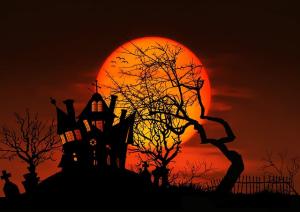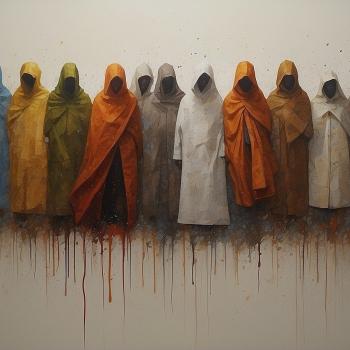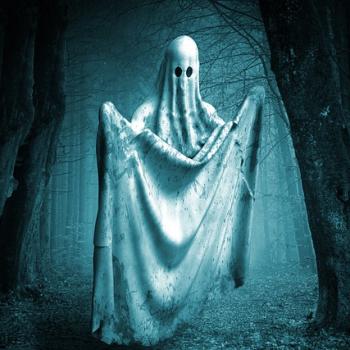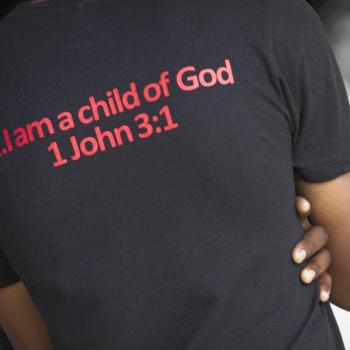
Should we condemn Halloween as a Celtic pagan holiday with ties to modern-day witches and devil worshippers? Embrace it as a harmless secular celebration where children dress up and eat candy? Or ignore it altogether?
What should Christians do? Let’s take a look at some options.
We Should Condemn Halloween!
A blog on Christian Today quotes Ben Godwin, pastor of Goodsprings Full Gospel Church, as emphatically saying that Christians “must resist what is popular in today’s society and condemn the pagan practices being observed.” Read more here.
I can almost hear the insistence in his voice.
Pastor Godwin acknowledges that Christians face a dilemma: imitate the world and lose our distinction or isolate ourselves from the world and lose our influence.
He applauds churches that offer alternatives to Halloween, such as trunk-or-treat. Even then, he’s against Christian parents dressing their children as witches and other “creepy characters they try to teach them not to emulate.”
Godwin believes that Christians “have no business” dabbling in witchcraft, and he specifically mentions crystal balls, horoscopes, palm reading, seances, Ouija boards, mediums and black magic. Rather, he says Christians should use the Bible to filter false beliefs from their lives.
In a Patheos Answers the Question post, historian, writer and professor Kathleen Mulhern, PhD., says that a pagan festival called Samhain coincides with Halloween. It’s one of eight major festivals that most pagans commemorate every year. Read more here.
There is an overlap between many Samhain traditions and culturally popular Halloween rituals, she adds. Both, for example, use jack-o-lanterns with candles, cornucopias, scarecrows and the like.
But paganism and Christianity part company in a number of significant and unsurprising ways. One difference is pagans’ belief that Oct. 31 is the “most powerful holiday for contact with the spirit world,” as evidenced in many of their costumes and symbols. Christians take a dim view of this belief. Another difference is that pagans believe in many deities. Christians do not.
Dr. Mulhern explains that pagan spirituality “encourages practitioners to honor those deities they find themselves most drawn to, to incorporate the traditions that best fit their sense of the divine, and to practice rituals with creativity and generosity.”
I can understand why Pastor Godwin has a problem with Halloween.
Why Not Enjoy the Holiday?
Beth Allison Barr, a professor of history at Baylor University and Patheos contributor, embraces Halloween. In her Patheos article, Why Evangelical Christians Are Afraid of Halloween, she describes the Halloween activities that she and her husband, a Baptist minister, enjoy with their children. They carve pumpkins, make Halloween treats and watch kid-friendly TV classics such as “It’s the Great Pumpkin, Charlie Brown.” Read more here.
Barr’s areas of expertise include medieval and early modern England and church history. She argues that Halloween is more deeply rooted in Christianity than in paganism. She also believes that “buried in protestant anti-Halloween rhetoric, a fear of Catholicism endures.”
A post by the Vatican News, no less, has this to say:
“While some people have connected Halloween to earlier pagan celebrations of the new year, Halloween actually has significant Catholic roots. The name itself comes from All Hallow’s Eve – that is, the Vigil of All Saint’s Day….when Catholics remember those who have gone before us to enter our heavenly home.” Read more here.
It seems that in 837 A.D., Pope Gregory IV instituted the observance of All Saints Day on Nov. 1, which made Oct. 31 All Hallows Eve. Many Catholics began to commemorate the latter and continue to do so to this day.
All was well – or so it seemed – until 1517, when the Protestant reformation split the church. In its aftermath, radical Protestant reformers eliminated holidays with Catholic roots such as All Hallows Eve. Some even cancelled Christmas.
Why Not Forget about Halloween?
Patheos blogger Vance Morgan believes “Halloween is a generally useless and stupid holiday.”
He admits to participating in it as a child and a parent with young sons. As children, he and his brother collected enough candy to fill several bowls, even though they avoided the homes of neighbors who attended his church. He explains their reasoning. Halloween was a favorite target of their pastor, who saw the holiday as a celebration of the devil, pagans and demons.
Morgan has put the holiday and the entire costume scene behind him. “As a 61-year-old guy with no children in my life, I don’t do Halloween,” he says.
Rather than handing out treats, he and his wife escape to a late-afternoon movie followed by dinner “so we can be conveniently away during whatever time the parental units deem it safe for children to be trick-or-treating.”
I Don’t Do Halloween, Either
Vance Morgan has the right idea.
Why do so many American Christians go all-out for Halloween, anyway? It doesn’t seem to have a reason for existing. It doesn’t celebrate some significant event, such as Christ’s birth or resurrection. It doesn’t remind us to be thankful for our blessings. And we don’t commemorate our independence or recognize our country’s veterans.
Christmas has become a commercialized holiday that focuses on Santa Claus as much as or more than Jesus. Easter is all about the Easter bunny. And many of us spend Thanksgiving watching football and eating way too much. Patriotic holidays, for the most part, have become more about enjoying a day off than celebrating our independence or recognizing veterans.
It seems to me that the major holidays, including Halloween, have become money-making rackets for retailers. Last year, Americans spent a record 10 billion – billion with a “b” – dollars on Halloween, according to National Retail Federation. It’s hard to fathom, but it isn’t surprising.
Major retailers in the U.S. start selling Halloween merchandise before Labor Day. Their candy-filled shelves, displays of plastic jack-o-lanterns, and racks of costumes representing all manner of witches, ghosts and popular movie characters are hard to escape.
It’s Halloween overkill for me, although I do enjoy seeing arrangements of real pumpkins without faces, bales of hay and potted mums decorating porches around the neighborhood.
Halloween was fun when I was a child and when I had small children. Now, I’m thankful to live in the country where no trick-or-treaters venture. Even my grandchildren have outgrown the holiday.
My only Halloween-related activity this year is working on tickets to an upcoming Bluegrass Festival at my church. My daughter designed them, and I plan to spend several afternoons trimming them down to size.
We need them in time for my church’s Trunk-or-Treat on Halloween. It sometimes draws as many 1,000 children each year, so I will be busy for the next few days. When we drop treats into the children’s Halloween bags, we will also drop flyers inviting them and their families to the festival.
When I finish trimming tickets, I can go about my business without a thought to buying candy or decorating my home with gaudy jack-o-lanterns or scarecrows. I can relax with a good book, watch a favorite movie or color my hair without worrying that I’ll scare little goblins who have come to my door.
I’m a devout Christian, and I think Halloween is whatever you make it to be.
Do you see it as a dark holiday with ties to the devil? Then, speak out.
Do you enjoy celebrating it as a secular holiday with the children in your life? Then, dress up and have a party.
Do you want to ignore it? Then, tell the world, “I don’t do Halloween.”
By the way, I don’t.












